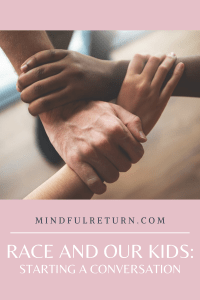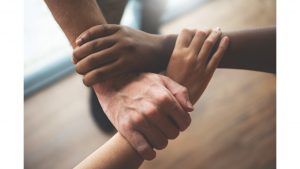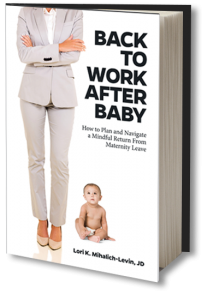Race. America. Black. White. This week we fell off another cliff. Again.
Like many, we mourned George Floyd in our house this week. Like many, I’m at a loss for what to say here. This isn’t about me. It isn’t about how white people like me feel.
And I can’t say nothing. I feel my privilege stinging me acutely to speak and act. Mindful Return gives me a microphone of sorts, and I feel compelled to use it in whatever tiny way might make a small smidgeon of difference.
My husband grew up with a father and grandfather who joined the Civil Rights marches in Washington. I grew up with a father who continuously screamed disgusting racial epithets at the television. Neither upbringing left us, as white parents, knowing exactly what to say to our kids this past week, though.
In my search for what to say, what words to use to talk about race more deeply with my children than I ever had before, I happened upon the Facebook post of my friend, fellow working mama, and Dentons colleague, Malka Zeefe. My own youngest son just turned 7, so her opening line caught my attention immediately. Her example showed me a path. I followed it. My kids listened. We are continuing to talk. They are continuing to listen. And Malka is graciously allowing me to share here what she wrote.
*******************************************
Talking to Our Kids About Race
Malka Zeefe’s Facebook Post, May 27, 2020
A few weeks ago, my white son Simon turned 7.
A few days later he said Ahmaud Arbery’s name and age and looked at his face, and we talked about what white men—including former law enforcement—continue to do to Ahmaud Arberys.
Today he said George Floyd’s name and age and looked at his face, and we talked about what police officers continue to do to George Floyds. We also took a step back and he said Trayvon Martin’s name and age and looked at his face, and we talked about what George Zimmermans continue to do to Trayvon Martins.
Today we watched together and talked about what Amy Cooper did and what Amy Coopers are capable of doing and continue to do to Christian Coopers. Recently, we started watching Raising Dion, and we paused to talk about how principals and teachers and other adults continue to treat Dions, especially when they’re next to Simons.
I’ve tried to have both inclusive and antiracist conversations with him throughout his life—admittedly imperfect, incomplete, and too infrequent. But we’ve gotten to the point (maybe already past?) where I decided the general should give way to the specific.
Again, I’m doing this far from perfectly. Every time I say anything, his newly-7 year old responses (and his 4 year old brother’s responses when he’s part of the conversation) remind me of that. But I must remember (and ensure) these are not one-time conversations.
Every conversation will become groundwork for the next, with both of us growing with each one. Each delivering more grace and confidence on my part, while becoming more ingrained for him.
But as long as a specific set of his friends and other kids continue to receive the unimaginable “talk” from their parents, he surely needs to be getting his own as well.
I have a lot to learn and unlearn myself. And some of that I hope my kids will internalize through observation and modeling. But that’s not enough for what still has to be done. Nothing is enough. But *nothing* is not enough. Nothing is unacceptable.
Building a Diverse Library for Our Kids
Malka Zeefe’s FaceBook post from May 29, 2020
Thank you to those of you who’ve made it a point to have conversations with your kids after reading my last post. Because of that, I will also share a companion topic: that I’m making it a priority to build a diverse library for my kids as well. Not just haphazardly as I’ve already done over the years; but aggressively.
“Books are sometimes windows, offering views of worlds that may be real or imagined, familiar or strange. These windows are also sliding glass doors, and readers have only to walk through in imagination to become part of whatever world has been created and recreated by the author. When lighting conditions are just right, however, a window can also be a mirror. Literature transforms human experience and reflects it back to us, and in that reflection we can see our own lives and experiences as part of the larger human experience. Reading, then, becomes a means of self-affirmation, and readers often seek their mirrors in books.”
— Rudine Sims Bishop
“If you only read the books that everyone else is reading, you can only think what everyone else is thinking.”
— Haruki Murakami
These are a few steps I’ve taken to make this library-building process more simple, and encourage you to consider as well:
- Subscribe to the Atlas Book Club.
- Buy one or more Coretta Scott King Book Award winners.
- Read other vetted compilations of antiracist kids books, including:
- How to Talk to Kids About Race: Books and Resources That Can Help
- 31 Children’s Books to Support Conversations on Race, Racism, and Resistance
- 9 Children’s Books About Police Brutality
- Kids Book Guide (compiled by Amy Chapman)
- A compilation of compilers: Where to Find Diverse Books
- Buy one or more diverse books from other sources. One source is this highly-discounted kids book source I found with an impressive offering of diverse authors, subjects, and topics: kidsbooks.com; but you can also use this as an opportunity to support your independent bookstores [edited to add: I have now seen authors direct readers to www.bookshop.org for this purpose].
- Consider opening your ears to friends’ recommendations.
[Malka agreed to let me share her posts in case they end up benefiting you the way they did me. But she preferred to omit a bio and picture to accompany this post. Instead she encourages you to follow the thinkers and doers in the antiracism space who have offered resources and direction for taking this work further ourselves.]
Want more practical tips on working parenthood? Check out my book, Back to Work After Baby: How to Plan and Navigate a Mindful Return from Maternity Leave



